
Macaron Baking Problems Solved
Having problems with baking French macarons? Here's a macaron troubleshooting guide to help you bake perfect macarons that are round, smooth, have nice feet and are not dry, hollow, overbaked, browned or have sticky bottoms. Before we begin delving into what went wrong with your macarons, make sure you are using a reputable macaron recipe with proper macaron making techniques. Here's my Best Macaron Recipe, this guide is most suited for troubleshooting macarons baked with my French Macaron recipe.
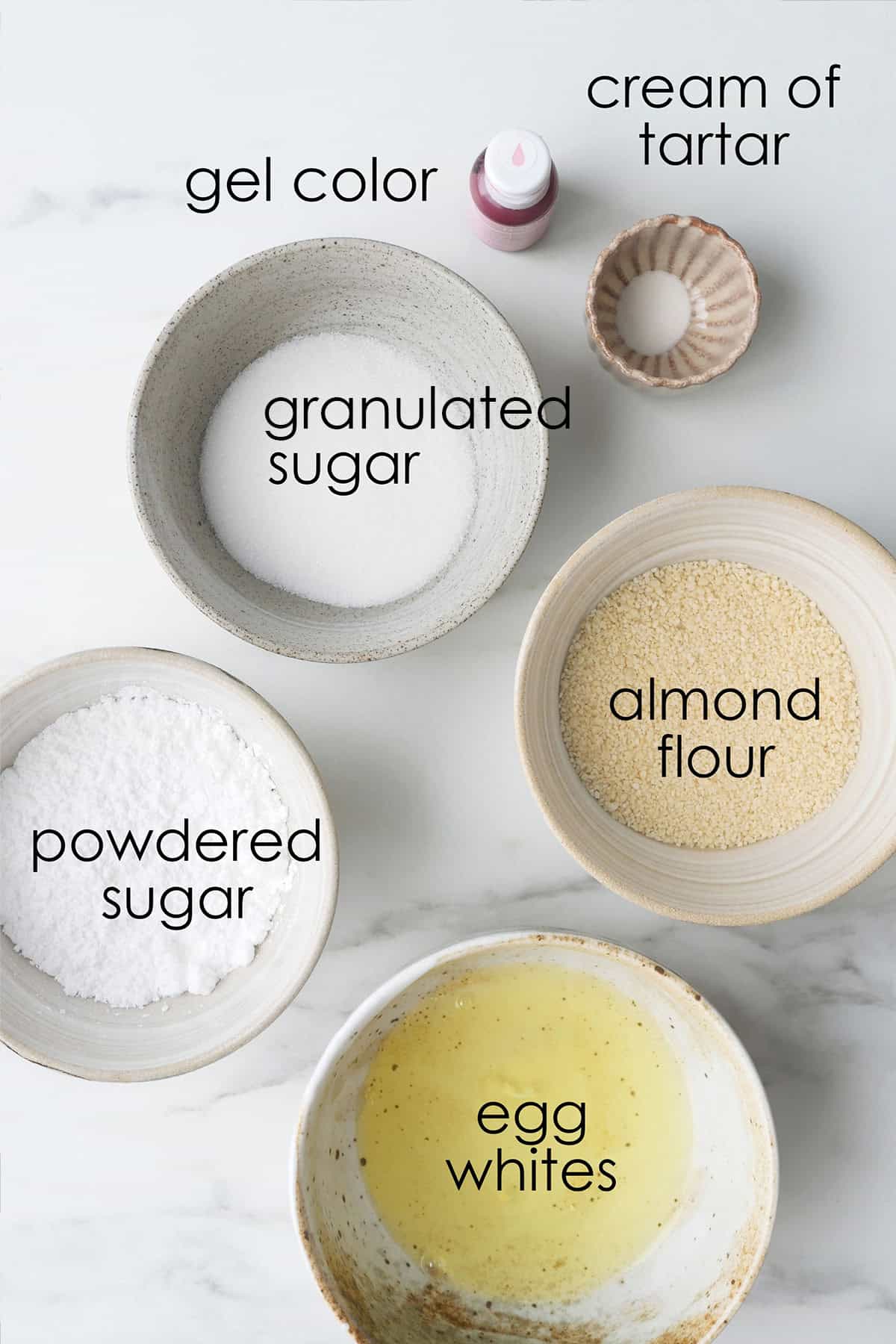
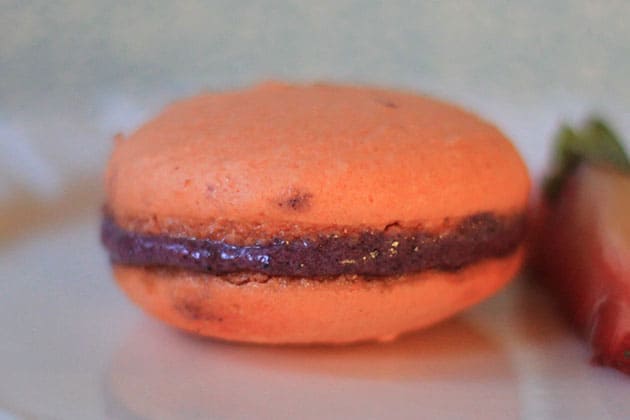
Why Didn't My Macarons Develop Feet?
Macarons may not develop feet due to a "wet" batter, shells were not rested, baking temperature too low or a poorly beaten/broken meringue. See fixes on how to bake macaron with feet below.
| Macarons Did Not Develop Feet: |
| - Macaron shell is too "wet" due to humidity or ingredients themselves had too much moisture FIX: turn on range-hood fan while letting macarons dry, turn on dehumidifier, use "aged" egg whites, avoid use of liquid colouring, use gel colouring instead. |
| - A skin did not develop before shells were put into the oven FIX: wait at least 30 minutes AND until a "skin" has developed before placing macarons in the oven. It should have a dull matte finish. |
| - Baking Temperature Too Low FIX: Increase temperature to allow shell to develop properly. |
| - Poorly Beaten or Broken Meringue FIX: Use some cream of tartar or vinegar to stabilize meringue while beating. Use a clean oil-free bowl and ensure egg whites are free of any yolks. Make sure you achieve stiff peaks but stop beating egg whites once it reaches that stage. |
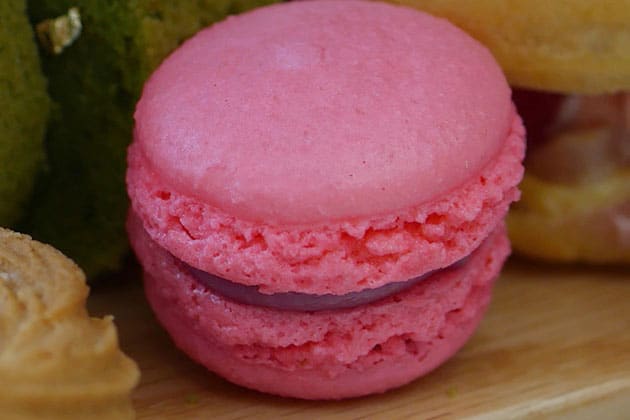
Why Did My Macaron Feet Spread Outwards?
Macaron feet may spread outwards if the oven temperature is too high or if the batter is overmixed. See how to stop macaron feet from spreading below.
| Macaron Feet Develops Quickly and Outwards Past Its Shape |
| - Baking Temperature Too High FIX: Turn down oven temperature, increase bake time. |
| - Flat Pancake like Shells from Over-mixed Batter FIX: learn when to stop folding during macaronage |
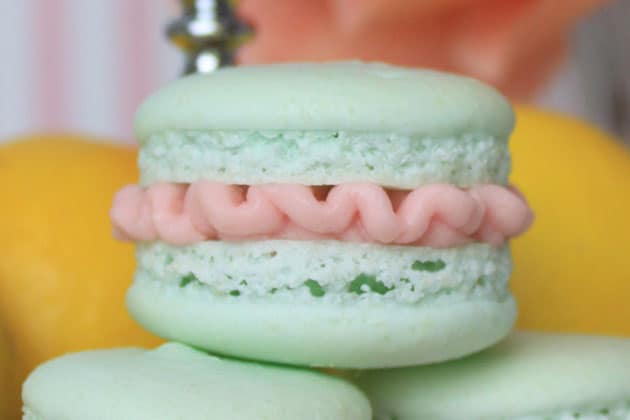
Why Did Macaron Feet Get So Tall?
Macaron feet may become too tall or rise too quickly if the baking temperature is too high, the meringue is over whipped or if improper macaronage techniques were used. See how to fix tall macaron feet below.
| Macaron Feet Rises Quickly and Upwards, Feet is Way Taller than its Rise: |
| - Baking Temperature Too High FIX: Turn down oven temperature, increase bake time. |
| - Over Whipped Egg WhitesFIX: Stop whipping egg whites once it reaches stiff peaks in the French method. Stop whipping egg whites once it returns to returns to room temperature in the Italian method |
| - Improper Macaronage Techniques FIX: Deflate some of the air in the batter by using proper folding techniques, should flow like molten lava, do the "Figure 8" test to test consistency |
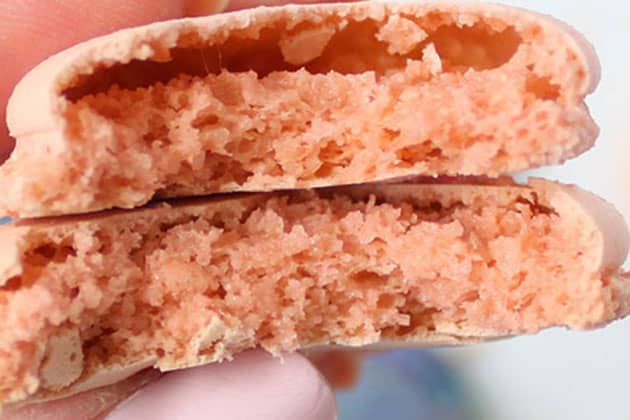
What Are My Macarons Hollow?
Hollow macarons with big gaps inside the shell are caused by a poorly prepared, broken meringue, under baked shells or use of improper macaronage techniques when folding. See how to fix hollow macaron shells below.
FURTHER READING: HOW TO PREVENT HOLLOW MACARON SHELLS
| Macarons have Hollow Shells: |
| - Under Whipping of Egg whites FIX: Make sure you beat the egg whites until stiff peaks before stopping. This will "dry up" the meringue. It should clump into a ball inside the whisk. |
| - Broken Meringue Due to Over Whipping of Egg whites FIX: Stop mixing egg whites once the white cling onto the bowl and a small clump of meringue is stiff. Stop beating whites as soon as whites have returned to room temperature for Italian method. It should look very thick, glossy and flow off the whisk like a bird's beak. Try whipping the meringue by hand instead with this tutorial. |
| - Under Baked Shell FIX: increase oven temperature to allow the body to rise fully, French method macarons bake well at degrees of at least 300F+, break open a sacrificial shell to check if it has fully set before pulling out the whole tray, bake until fully set. Make sure your macarons are getting enough heat by using high quality rimless pans. Parchment paper and Teflon baking sheets conduct heat a bit better than silicone mats. |
| - Improper Macaronage Techniques FIX: Deflate some of the air in the batter by using proper folding techniques. Should flow like slow molten lava. Do the "Figure 8" test to check consistency. |
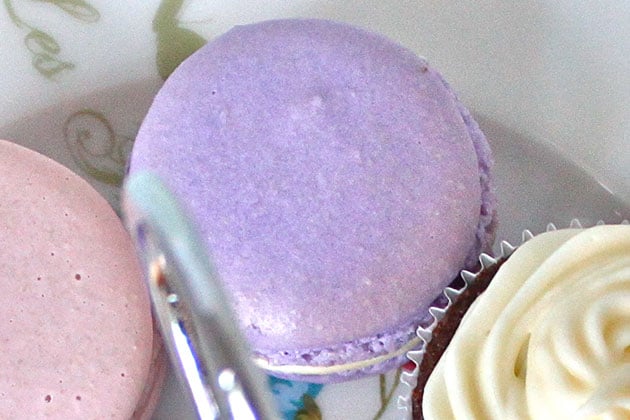
Why are the Tops of My Macarons Brown?
Tops of macaron shells can become browned if the baking temperature is too high or it's too close to the heat source. It's very important to control the oven temperature properly to achieve the desired results. Read how to fix browned macarons shells below:
FURTHER READING: HOW TO USE YOUR OVEN PROPERLY FOR BAKING MACARONS.
| Top of Macaron Shells are Browning |
| - Baking Temperature is Too High FIX: Decrease temperature, increase bake time. |
| - Too Close to Heat Source (assuming the heat source is from the top) FIX: Move further away from heat source while baking. Place an empty tray on the rack above it to shield it from the heat. |
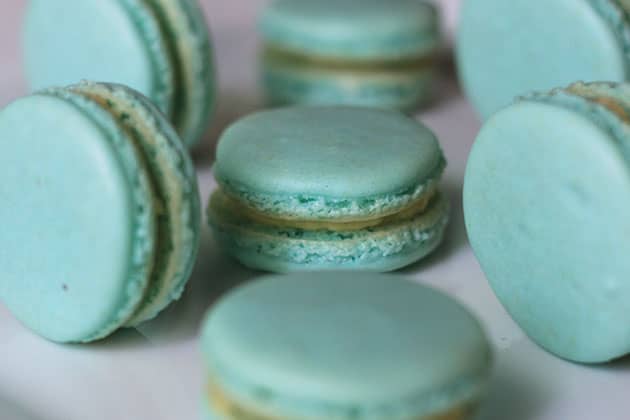
Why are the Bottom of My Macaron Shells Brown?
The bottom of macaron shells can become browned due to high oven temperatures and the baking tray being too close to the heat source. See how to prevent browned macarons below.
FURTHER READING: HOW TO USE YOUR OVEN PROPERLY FOR BAKING MACARONS.
| Bottom of Macaron Shells are Browning |
| - Baking Temperature Too High FIX: Decrease temperature, increase bake time. |
| - Too Close to Heat Source (assuming the heat source is from the bottom) FIX: Add an extra pan on the bottom of the current tray or move the tray up to a higher rack. |
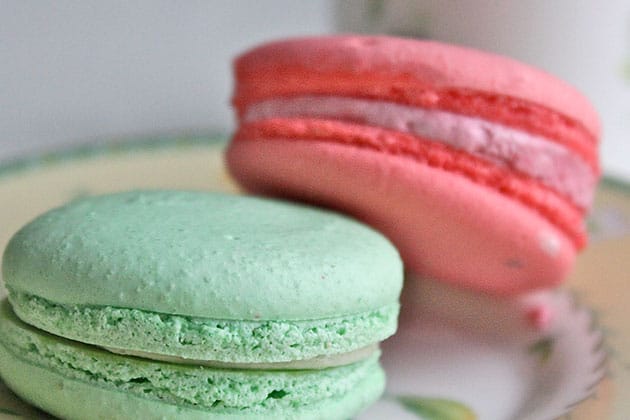
Why are My Macarons Lopsided?
Macarons can become lopsided from improper piping techniques, use of an overly strong fan to dry the macarons, oven's convection fan is too strong, use of a warped baking pan, shells were rested for too long, baking temperature too high or improper macaronage techniques. See how to prevent lopsided macarons below.
| Macaron Shells are Lopsided |
| - Improper Piping Techniques FIX: Make sure you are piping the batter straight down onto the paper or mat while holding the bag perfectly vertically. Dab a little bit of batter on the bottom of all four corners of the parchment paper so it will act as a "glue" to keep the paper in place while you pipe. |
| - Using Too Strong of a Fan FIX: Avoid using strong fans. Turn on fan in range hood as the air direction will be vertical and more uniformed. Dab a little bit of batter on the bottom of all four corners of the parchment paper so it will act as a "glue" to keep the paper in place. |
| - Oven's Convection Fan is Too Strong FIX: Avoid using convection fan. You may need to increase time and decrease temperature since your oven may not be as hot without the convection fan. Dab a little bit of batter on the bottom of all four corners of the parchment paper so it will act as a "glue" to keep the paper in place. |
| - Warped Baking Pan FIX: Use a good quality pan that won't buckle in high temperatures. This is a sturdy, rimless baking pan that conducts heat well for macarons. Throw out old warped pans. |
| - Shells Rested for Too Long FIX: Place shells in oven once it has developed a "skin" |
| - Baking Temperature Too High FIX: Decrease temperature, increase bake time. |
| - Improper Macaronage Techniques FIX: Make sure you are folding the batter properly and the wet/dry ingredients are homogenous before piping. Deflate some of the air in the batter by using proper folding techniques, should flow like molten lava, do the "Figure 8" test to test consistency |
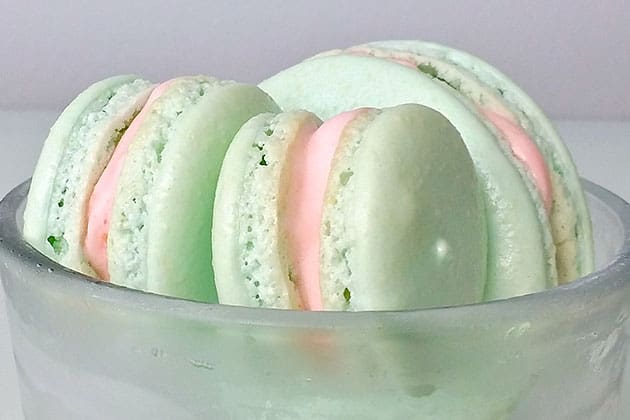
Why Do My Macarons Have Nipples or Points?
Macaron shells can have unsightly nipples or points due to an under-mixed batter. See how to prevent baking macarons with points or nipples below.
| Macaron Shells have "Nipples" |
| - Batter is Under-Mixed FIX: Add a few more folds next time. Learn to judge when to stop folding macaron batter. Rap the tray of piped macarons on the counter a few times, this will smooth out nipples from a properly mixed batter. |
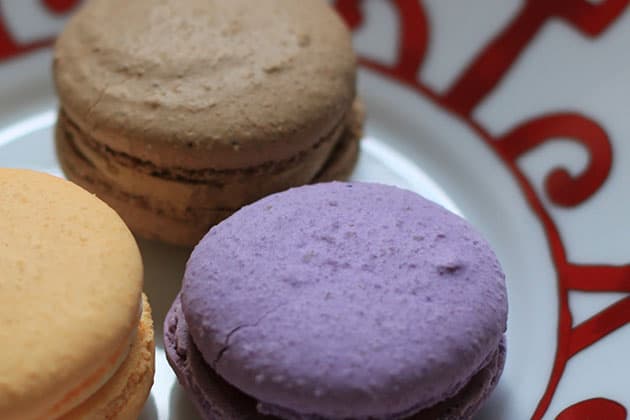
Why are My Macaron Shells Bumpy?
Macaron shells can be bumpy if the batter is not mixed properly and the almond flour/powdered sugar mixture is not sufficiently sifted. Learn how to prevent bumpy macaron shells below.
FURTHER READING: HOW TO BAKE SMOOTH AND ROUND MACARON SHELLS
| Macaron Shells are Lumpy and Bumpy |
| - Batter Not Mixed Properly FIX: Make sure you are folding the batter properly and the wet/dry ingredients are homogenous before piping. |
| - Almond Flour and Powdered Sugar Not Sifted FIX: Throw both ingredients into the food processor, sift and discard bits that cannot be sifted. A simple small food processor like this one is sufficient. |
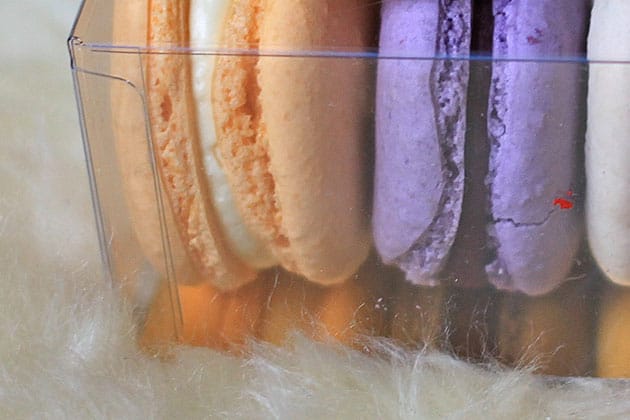
Why are My Macaron Shells Not Round?
Macaron shells can become irregularly shaped due to improper piping techniques, use of clogged piping tips, batter not properly incorporated, use of low quality parchment paper or an over-mixed batter. See how to fix macaron shells that are not round below.
FURTHER READING: HOW TO BAKE SMOOTH AND ROUND MACARON SHELLS
| Macaron Shells are Not Round |
| - Improper Piping Techniques FIX: Make sure to use proper piping techniques along with a sturdy piping bag that won't buckle as you pipe, Ziplock bags are not very good for piping macaron batter. Hold the bag vertically while piping, squeeze an equal amount on all sides. |
| - Clogged Pipe Tip FIX: Clean debris out of the tip before piping. |
| - Batter is not incorporated properly FIX: Use proper folding techniques to create a homogenous batter. Non homogenous batter creates "bumps" while piping. |
| - Use of and/or low quality parchment paper FIX: Use high quality parchment that won't curl easily when it comes into contact with the batter. Dab a little bit of batter on the bottom of all four corners of the parchment paper so it will act as a "glue" to keep the paper in place. Use a silpat mat instead, it will create beautiful round macarons every time. |
| - Over-mixed batter FIX: Learn to judge when to stop folding macaron batter. Immediately, as soon as the batter looks homogenous, pick some up with the spatula, drop it back into the bowl and observe how it falls back into itself. It should not look like a "PLOP". Rather, it should look like slow moving molten lava. It should fold into itself a few times like a ribbon but not like runny pancake batter. |
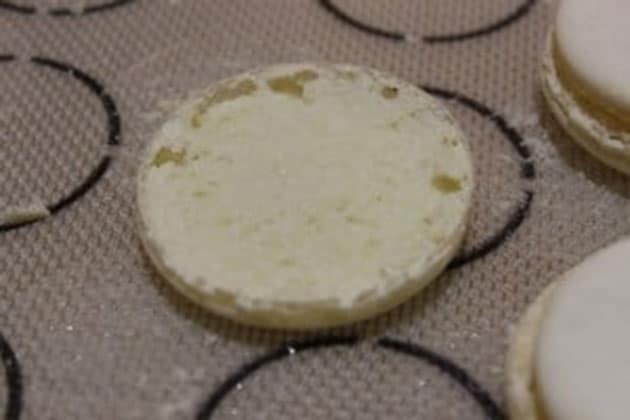
Why Do My Macarons Have a Concave or Inverted Bottom?
Sometimes macarons will have an inverted bottom like a contact lens and it doesn't stick to the baking mat. This can be caused by an over-mixed batter coupled with the use of a silicone baking mat. See how to prevent concave macarons below.
| Macaron Shells are Concave like a "Contact Lens", Bottom does not Stick to Mat |
| - Over-mixed Batter PLUS use of Silat Mat- Batter is too runny PLUS use of Silpat Mat FIX: This is one of the least discussed troubleshoots out there. If the batter is too runny, the shells will not develop properly. When piped onto a silpat mat, this problem is exacerbated by the fact that it will not stick onto the mat at all once baked. The feets will not stick to the silpat and breaks away. The body also rises to the top without touching the mat so it never full cooks on the bottom. If you find that your batter is already over mixed and unsalvageable, pipe them onto parchment paper instead. It will develop on the parchment paper but it will be runny and therefore, not round. A little more heat during baking helps fix this already broken batter. Preemptive measures include ensuring that you're using aged egg whites and whipping it to stiff peaks. This makes a big difference! |
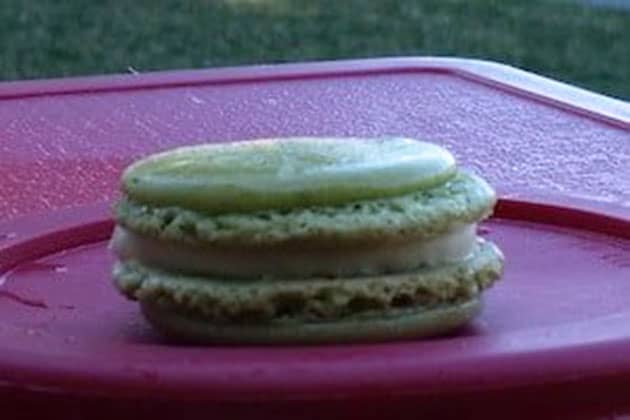
Why are My Macaron Shells Flat?
Macaron shells may come out flat due to over-mixed batter or a poorly prepared "wet" batter. See fixes below.
| Macaron Shells are as Flat as Pancakes/They Spread Quickly Once Piped |
| - Over-mixed Batter FIX: There is no way to salvage batter that is over-mixed. Once you deflate all the air in the meringue, the shells will not develop properly once placed in the oven. Start again. If you do want to bake them anyway, make sure you do not use a silpat mat as they will not stick to the mat and you will end up with concave shells that cannot be filled. |
| - Wet Batter FIX: Ensure your egg whites are aged and you are have reached stiff peaks before folding. Do not overfold as mentioned above. |
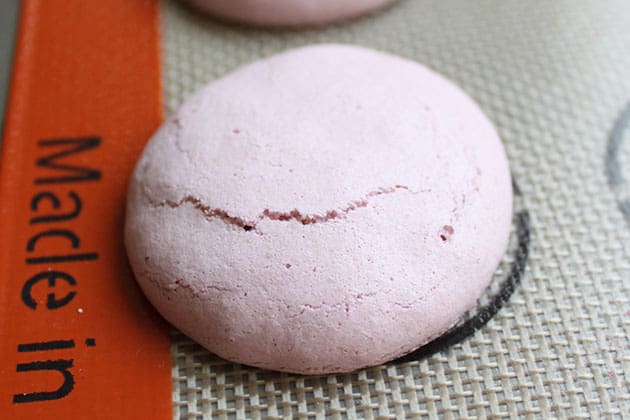
Why Did My Macaron Shells Crack?
Macaron shells can be cracked due to excess air that is trapped inside the macaron shell, oven baking temperature that is too high or a weak meringue. See how to fix cracked macaron shells below.
| Macaron Shell has Cracked |
| - Did not rap the tray against the counter after piping FIX: rap the tray firmly against the counter after piping. Flip the tray around and do it again in case you missed certain spots. |
| - Hot spots in the oven FIX: make sure you are getting good circulation in your oven by only baking one tray at a time. |
| - Meringue not stiff enough FIX: beat until stiff peaks form. |
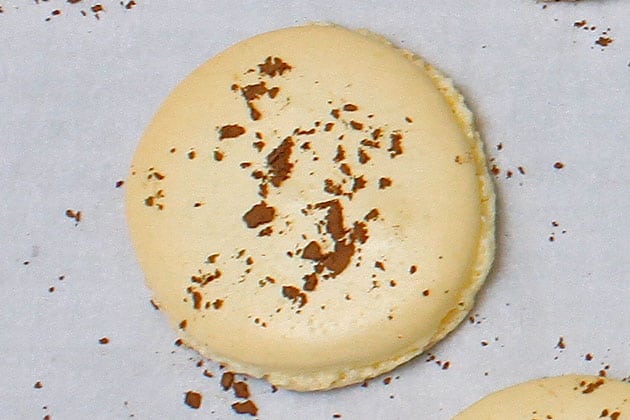
Why are My Macaron Shells Hard and Dry?
Macaron shells can be hard and dry to to over-baking. See fix below.
| Macaron is Hard and Dry: |
| -Over baked shells FIX: this is an easy fix! Fill the macaron with the filling and allow it to "mature" for 24-48 hours. It will soften up. You can always brush the bottom of the shell with milk or a syrup in the same flavor as your filling to help soften the shell.- Turn down temperature or decrease baking time on your next try |
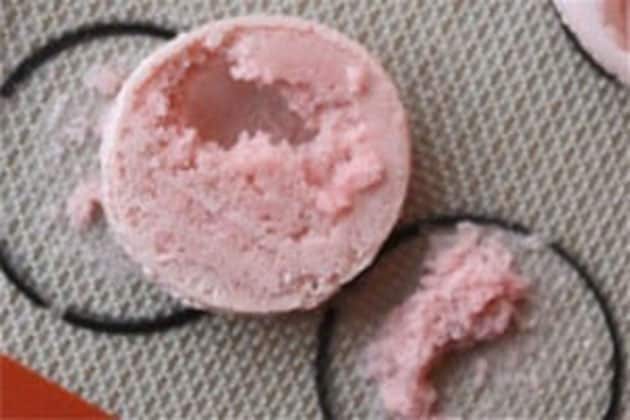
Why are My Macaron Shells Sticky and Sticking to the Pan?
Macarons that don't release easily, sticking to the pan may be caused by under-baking, a "wet" batter or use of improper macaronage techniques. See how to prevent sticky shells below.
| Macaron is Wet and Sticks to Pan after Baking: |
| - Under baked macarons FIX: Increase temperature or bake time |
| - Macaron shell is too "wet" due to humidity or ingredients themselves had too much moisture FIX: turn on range-hood fan while letting macarons dry, turn on dehumidifier, use "aged" egg whites, avoid use of liquid colouring, ensure meringue reaches stiff peaks before folding. |
| - Improper Macaronage Techniques FIX: Deflate some of the air in the batter by using proper folding techniques, should flow like molten lava, do the "Figure 8" test to test consistency. Do not overfold. |
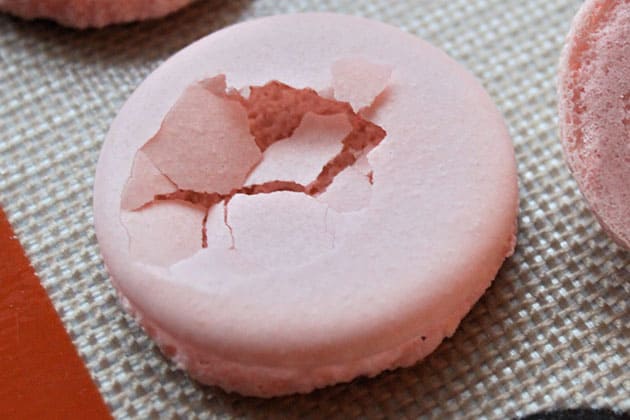
Why Do Macarons From the Same Batch Yield Different Results?
Macarons that yield different results within the same batch can be due to poor oven circulation, improper macaronage techniques, inadequate or different resting times or under beaten egg whites.
| Macaron has Inconsistent Results within the Same Batch: |
| - Poor Circulation in Oven FIX: Use convection setting, only bake one tray at a time. |
| - Poor Macaronage Technique FIX: Make sure batter is fully incorporated and you use the right folding techniques to deflate some of the air in the meringue |
| - Inadequate Resting Time or different resting times FIX: Make sure shells have developed a "skin" and looks dull and matte before placing in the oven. Don't forget, if batter from the same batch yields inconsistent results when piped onto different trays and baked at different times, this might be due to changes in oven temperature or too little or too much resting time. |
| - Under Beaten Egg Whites FIX: Make sure meringue reaches stiff peaks in the French method |
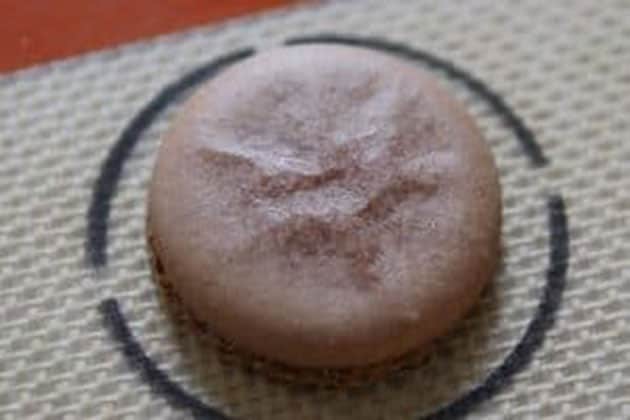
Why are My Macaron Shells Wrinkly and Blotchy?
Wrinkly macaron shells are caused by oven temperatures that are too low, over beaten meringues, over-mixed batter, incorrect ingredient ratios or use of "oily"/old/wet ingredients. See how to fix wrinkly and blotchy macarons below.
| Macaron are wrinkly and/or blotchy: |
| - Temperature too low FIX: try increasing your temperature by 25-50 degrees |
| - Overbeaten meringue FIX: Stop beating once the egg whites have clumped in the whisk and reached stiff peaks |
| - Overmixed Batter FIX: Fold only until the Figure 8 stage. Add colour in the meringue stage and not the folding stage as it's easy to overmix batter |
| - Incorrect ratios of ingredients FIX: if adding other ingredients to the shells such as cocoa powder or matcha powder, ensure that you're adding an amount that won't compromise the integrity of the make up. |
| - "Oily" ingredients FIX: over-processed almonds or addition of other ingredients that comprimise integrity of the shells. Always grind almonds with icing sugar. Check that your gel colours have not become runny. Always use gel colours instead of liquid, certain brands are more concentrated than others and requires less, recommended gel colour for macarons. Check the expiry date and composition of dry ingredients added to shells (cocoa powder, match etc.). Almond flour can be baked in the oven prior to use to "dry it out". Better yet, make your own almond flour for the most consistent and stable results. Here's how to make your own almond flour. |
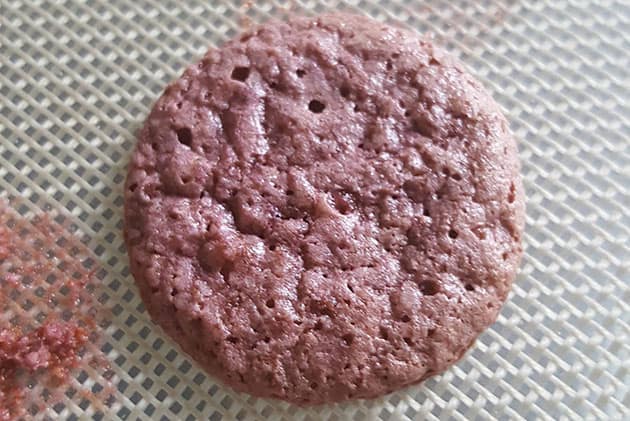
Why Are My Macaron Shells Porous with Little Holes on Top?
Porous macarons with holes on top are caused by a meringue that is too soft or a wet batter. See how to fix porous macarons below.
| Macarons are porous with holes: |
| - Meringue too soft or broken FIX: Beat meringue until stiff peaks and stop immediately once stiff peaks has been reached. |
| - Batter too wet FIX: Watch out for addition of ingredients with too much moisture like extracts, water-based food color or expired gel colours. Do not use extracts in the batter if you don't have a reliable recipe for this. Recommended gel colour for macarons. |
| Note: porous macarons are not due to oven temperatures. |
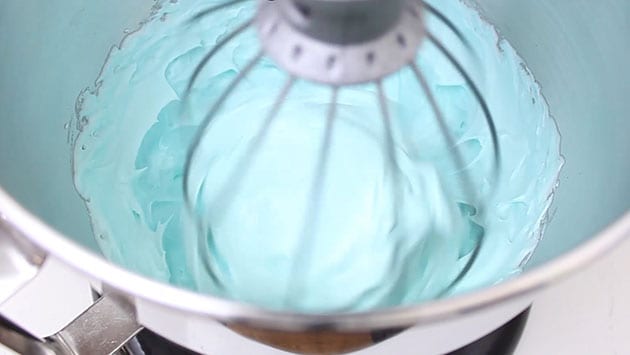
Why is My Meringue Not Stiffening Up?
The meringue may take a long time to reach stiff peaks (or never reach that stage) because of cold egg whites, foreign substances in the meringue, improper whipping speed or its already over-whipped.
FURTHER READING: HOW TO WHIP PERFECT MERINGUE FOR MACARONS
| Meringue doesn't get stiff |
| - Egg whites are too cold FIX: cold egg whites are harder to whip and takes longer to increase in volume. Let the egg whites come to room temperature naturally or by placing the egg whites in a cup surrounded by warm water. |
| - Foreign substances in the meringue FIX: make sure the bowls and whips are completely clean, dry and free of oils. To remove oils, use lemon juice or vinegar to wipe down equipment before whipping. Use stainless steel or glass bowls instead of plastic. Use caution when adding extracts into the meringue as using too much can deflate it. |
| - Improper whipping speed FIX: Avoid whipping on high in the beginning. Start whipping on low speed and gradually increase to medium and then to medium-high. While whipping can be done by hand, it is recommended to use a hand-held mixer or Kitchenaid. |
| - Meringue is already over-beaten FIX: over-beaten meringues will become grainy and flat. Start again and next time, test the meringue occasionally to see if it has reached stiff peaks. Stop mixer, pull the whisk out and see if the peak left in the meringue points upwards without drooping. The bowl can be turned upside down and the meringue won't slide. |
| Note: adding cream or tartar or another acid into the meringue can help stabilize it. |
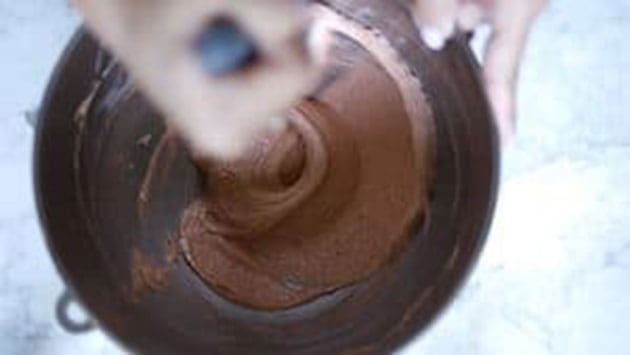
Why Does My Macaron Batter Get Thicker While I Am Folding?
Sometimes, macaron batter actually gets thicker while folding. This can be due to incorrect measurement of ingredients, incorrect division of batter if making multiple batches, meringue is too try or gel colors are corrupted. See how to prevent macaron batters that get thicker while folding.
| Macaron batter gets thicker while folding: |
| - Incorrect measurements of ingredients FIX: a kitchen scale is a must when making macarons. If you use cups to measure your ingredients, you might end up with too much almond flour or too little egg whites leading to a thick dry batter that never thins out no matter how much you fold. |
| - Incorrect measurements when splitting the batter to make multiple colors. FIX: Use a kitchen scale to carefully weigh out ingredients. Make one batter at a time for each color. Completed batters can be kept inside a piping bag for up to 2 hours. |
| - Meringue too dry FIX: Make sure the sugar is added into the egg whites at the correct time, when the beater starts leave tracks in the egg whites, add the sugar and do not overbeat. Stop whipping once the meringue does not slip in the bowl when turned upside down. |
| - Gel colours are corrupted FIX: Shake bottles before using and add the colour during the meringue stage instead of the folding stage. Make sure they are not expired. |
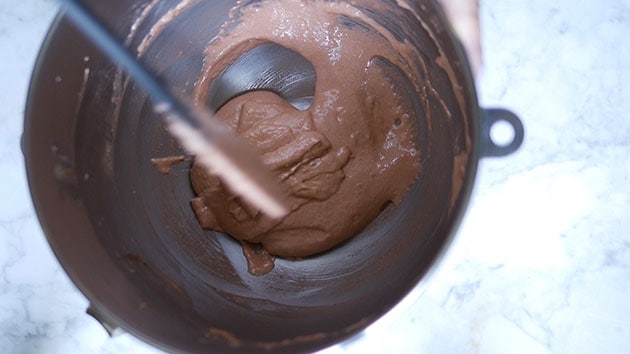
Why is My Macaron Batter So Runny?
Runny macaron batters that fall off the spatula quickly like pancake batter are caused by a poorly prepared meringue, introduction of foreign ingredients into the batter or from over-folding during the macaronage stage. The ideal macaron batter should be thick and slow-flowing like honey.
| Macaron Batter is Runny: |
| - Poorly prepared meringue FIX: Beat meringue to the stiff peak stage before folding. |
| - Introduction of foreign ingredients into the batter FIX: Be cautious when adding extracts into the meringue, this can easily deflate it. It's better to flavour the macaron with the filling instead. Be careful when adding other foreign substances into the batter which can cause it to become "wetter". |
| - Over-folding during macaronage FIX: Constantly check the batter consistency while folding. Stop folding immediately when the batter flows slowly like honey and a figure-8 pattern can be drawn when the batter is picked up and dropped. See video on How to Fold Macaron Batter in real time. |
Here are some other posts which will help you fix your macaron problems once you have pinpointed what the problem is after reading this Troubleshooting guide:

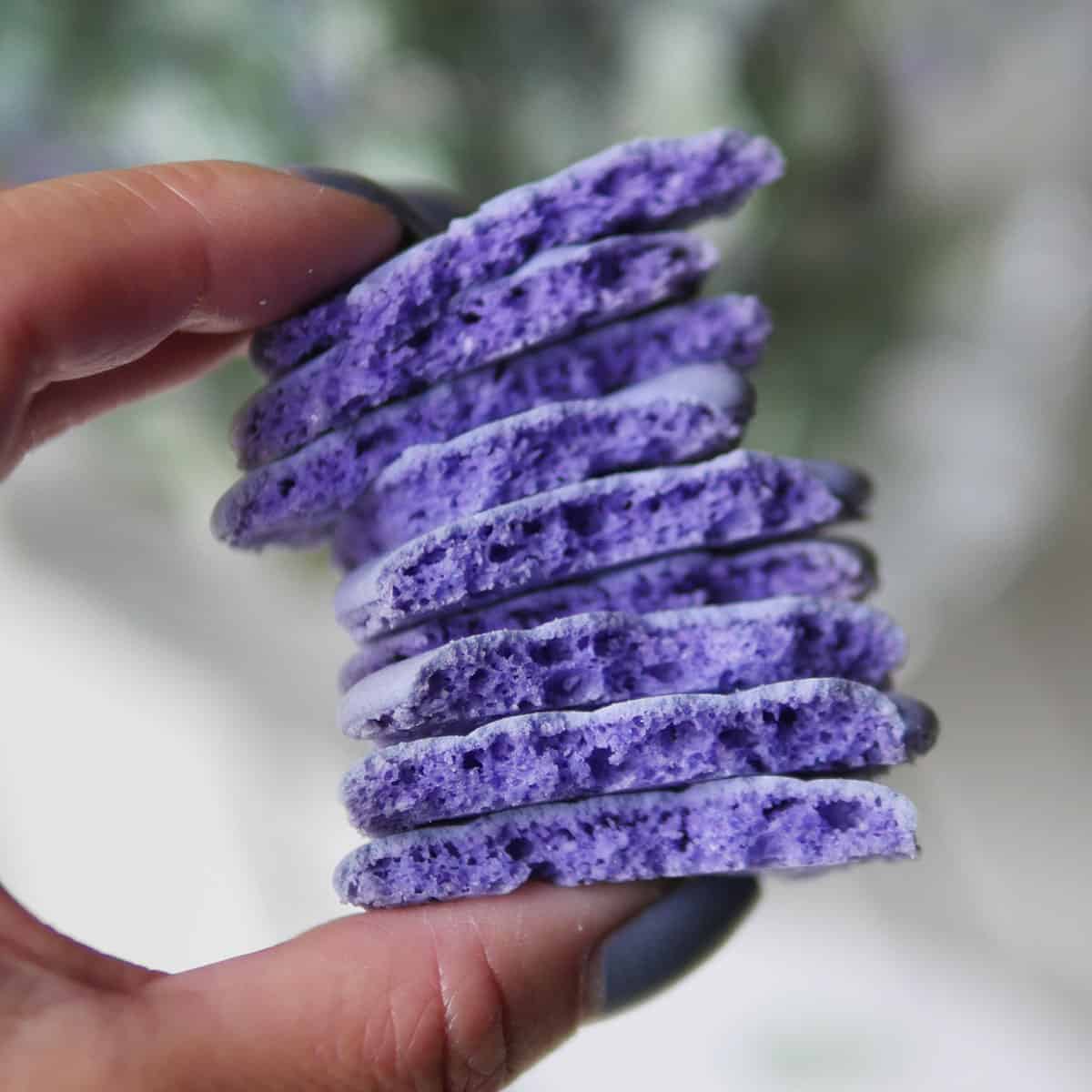
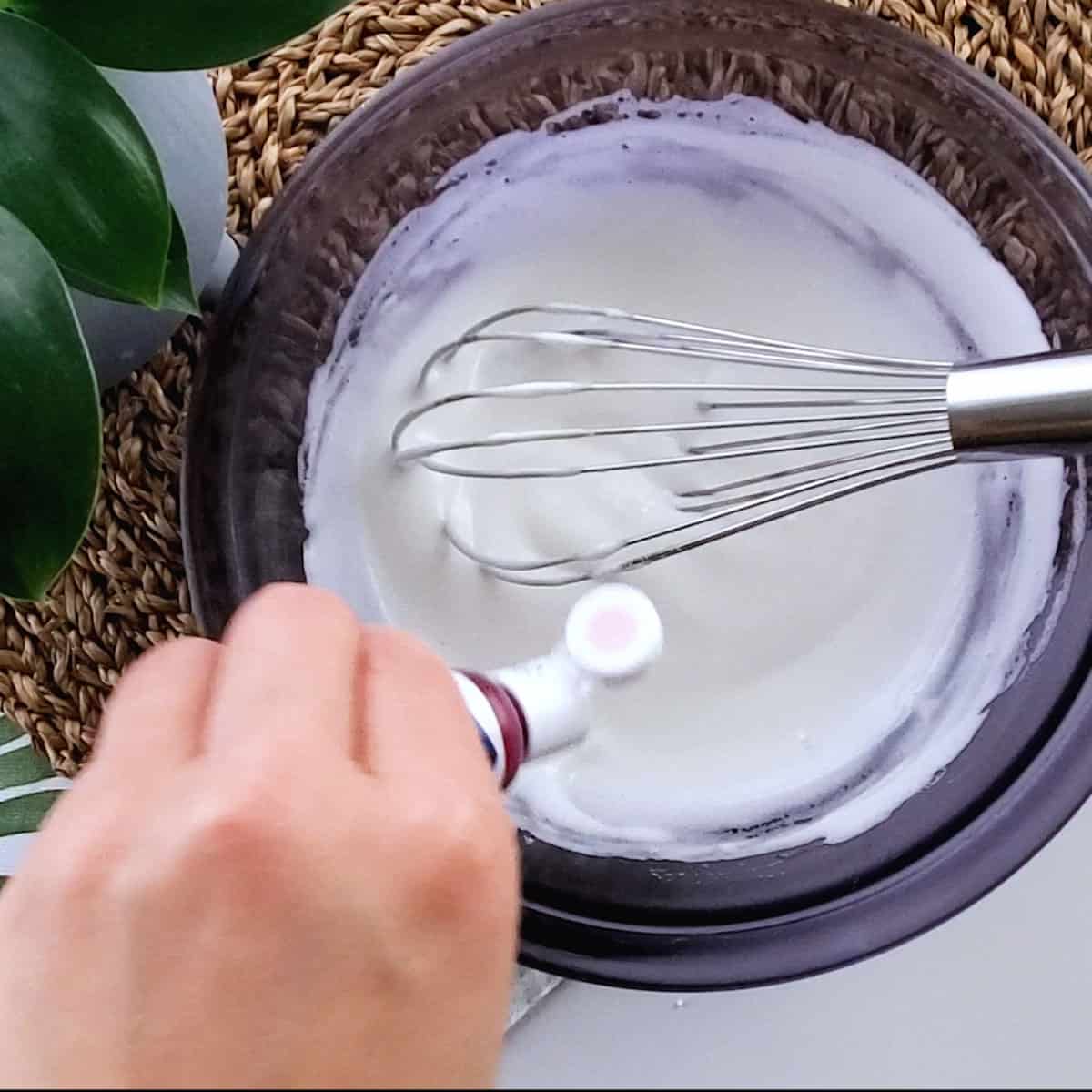

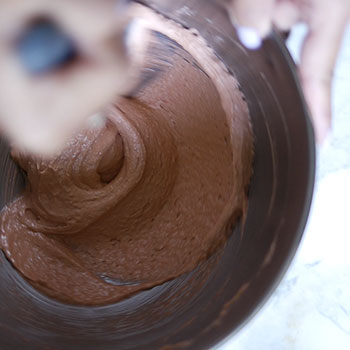
Ariel says
Hello, so I’m actually trying to get bigger feet on my macs. I use a Swiss meringue, let them rest til they form a skin.
I typically bake them at 310 for about 14 minutes
I do get small feet (think 1/8th of an inch) but I’d like them to be a little taller and more pronounced.
But my shells are full, don’t crack, and still taste delicious 😋
Jose says
Hey, I just made a batch of macarons in two bakings, but I used the same pan, that was hot, to bake the second round. The first ones came perfect but the second one cracked on the top and developed no feet. I'm guessing it was the fact that the pan was hot and they heated to quickly, so I'm just letting you know just to add my 2 cents to the troubleshooting guide, which is great by the way
Mimi says
Thanks for contributing your experience here, really good insight! Your oven may also be running a bit hotter after a while of being turned on.
XOXO,
Mimi
Zuleikha says
Hi Mimi! Thank you for your post! I’ve made macs multiple times, and the last time I made them I put extra effort such as weighing ingredients, proper macronage, monitoring oven temp, aging egg whites. I used a silicone mat for the first time and my macs came out cracked with no feet. I’m not sure where I went wrong, as I’ve been successful many times before. I used pies and tacos recipe, and baked at 300 instead of 325, should I increase temp or go back to using parchment paper. PS I live in humid Florida, but I’ve made successful macs before.
Mimi says
Hi Zuleikha,
I like that you're being very careful with your preparations. That's a great start. I think it's best to ask the recipe writer of your recipe since they will be in the best position to help you with the specific problem you're having with the macarons you are making with their recipe. Happy Baking!
XOXO, Mimi
Manesty says
My batter is too thin. This is the second time it has happened. I have followed your recipe exactly, any suggestions?
Mimi says
Hi Manesty,
Have you whipped up the meringue stiff enough? Thin batters come from meringues that are too weak or batter that is over folded. Make sure to use a kitchen scale so all measurements are accurate 🙂
XOXO,
Mimi
Fae says
Hi mimi, i used the scale and mixed the dry ingredients and sifted it, but the batter turned out to thick. Was it because i used almond grounds instead of almond flour?
Mimi says
Hi Fae,
It depends on how coarse the ground almonds are. I often use my own ground almonds that are sifted and have no issues. It might be due to one of the other issues in the section for "Batter gets dryer as I mix"
XOXO,
Mimi
Stefanie Fischer says
Can the folding be done by a hand mixer or does it have to be hand folded?
Mimi says
You can mix/fold the batter in the mixer with the paddle attachment but should ideally finish off the folding by hand to prevent over-mixing of the batter.
XOXO,
Mimi
Ruth says
Hi, I can't find anything anywhere that explains why my macarons might be lacking a finished bottom shell. It's not like a sticky bottom. It's like a concave bottom but without the nice smooth finish. You can see the porous insides. The tops and the feet are otherwise beautiful. Please help if you Ruth
Mimi says
Hi Ruth,
I think this sounds like the concave macaron problem I have listed in the post. I'm not quite sure the difference between what you're describing and the concave in the post. If you can elaborate, then I can help 🙂
XOXO,
Mimi
Ruthwi says
I experienced quite the same like you. Concave, no feet / bottom plus : crispy dry shell. It was just because i received my new silpat and used it for the first time plus my batter at that time was a bit runny. Thank you mimi for your complete troubleshooting fix list.
Mimi says
Happy it helped you!
XOXO,
Mimi
Bruna says
Hi Mimi! My macarons have a mix of issues that you have different recommendations for, so I wanted to ask if you knew of a possible solution?
They’re always wrinkly/blotchy, and the insides are kind of sticky, almost gummy? That might not be the right word. But then while the insides are like this, the macarons are browned at the bottom.
Also, they’re usually flat too. Sometimes, the shells rise a bit in the oven but once I take them out, they fall (and get the wrinkly feel). For some of these issues, you said to increase the oven temp. But then the others, you said decrease. Is there any chance you have any ideas for how I could fix this? I know one of my issues is that I’ve used liquid coloring and not gel coloring. But I’m not sure if that’s the culprit of everything wrong with my macarons.
Thank you so so much!!!!
Mimi says
Hi Bruna,
The liquid coloring must go 🙂 Please use gel coloring before you try to troubleshoot anything else. If you are using gel coloring and you're still having problems, then we can troubleshoot from there.
XOXO,
Mimi
Laura Drozynski says
Can I add flavoring to the batter? And if I do, should I cut back on anything else?
Mimi says
Hi Laura,
You can add some dry ingredients like flavored powders (coffee, tea bits, ground sesame etc) into the dry mix. Or you can add extracts to the meringue. However, it takes some trial and error as each ingredient will require a different ratio to make it work. Either do some testing on your own or look for reliable recipes 🙂
XOXO,
Mimi
Aruna Bose says
Hi, Regarding the browning of the macaron shells - when you say to place extra pans at top/bottom to shield the shells from the heat, do you mean I should do this from the start? Or halfway through the baking? Thanks!
Mimi says
Hi Aruna,
You can test out both cases. I usually put the pan in from the very beginning, you can also do this a bit later if you like, after the feet has started to develop.
XOXO,
Mimi
Kath says
Made my first batch of macarons yesterday, chocolate with chocolate ganache filling. Overall, I was pleased to see they had feet with smooth shells. Piping was an issue at first, causing some to be lopsided and different sizes. They are chewy and crunchy, but the shells are cracking (exploding is more appropriate) when you try to eat them. Did I overbake, and/or was the oven to hot at 300 degrees, for 15-18 minutes for 1" shells?
Mimi says
Hi Kath,
When you say they are exploding when you try to eat them, what do you mean? Do you mean they are too crunchy? You can brush some syrup/milk to shells that are too hard because they're overbaked. This will help soften them some more during maturation. In terms of the oven time and temp, it sounds okay to me but it's hard to pinpoint exactly where it went wrong if I haven't seen your whole baking process.
XOXO, Mimi
Cheryl says
My macarons look as if they are baking perfectly in the oven, but almost as soon as I take them out to cool, they deflate and get flat. Any suggestions on how to fix this or where my process went wrong?
Mimi says
Hi Cheryl,
You might have overwhipped your meringue causing it to collapse. Sufficiently heat is also needed for the shells to fully bake through. Make sure you're not bringing the macarons out too soon.
XOXO,
Mimi
Jordan says
Hi, Mimi!
I was wondering if you've ever heard of concave macs due to undermixing the batter or oily flour? I've always struggled with slightly concave bottoms (burnt fragile feet, sticky middle) that are caused by the feet rising, then flying off the mat and sinking. I deliberately undermix my batter so that it forms an almost figure 8 but still breaks off a little, it is even still a little grainy, to combat the issue but it seems to make it worse... They are always kind of cooked on the sides, almost burnt, but raw and sticky in the center...
Mimi says
Hi Jordon,
I haven't had experience with concaves from those conditions, usually, it's from the other conditions I've already outlined in the troubleshooting guide. Even when undermixing, if there is something wrong with the meringue, it can still cause concave bottoms. I would try to focus on the meringue some more.
XOXO,
Mimi
Helena says
Hii, I have a problem. I've been making macs with your recipe, but when I pop them innthe oven they grow feet then till the end of the baking they fall down and spread feet. Can you tell me how to fix it?
Mimi says
Hi Helena,
Without seeing your process, it's hard to pinpoint exactly but it sounds like a combo of under whipping meringue and overfolding the batter. Just whip it to stiff but no longer and then fold it just until the ribbon stage.
XOXO,
Mimi
Tatiana says
Hi there,
Thanks a lot for the tips & tricks!
Could you please suggest how much powder color should I add to the dry ingredients? I cannot find this info anywhere.
Thank you!
Mimi says
Hi Tatiana,
I'm glad you found it useful. I think this would depend on the color you're using and how vibrant you want it. I would start with 1/2 tsp and go from there.
XOXO,
Mimi